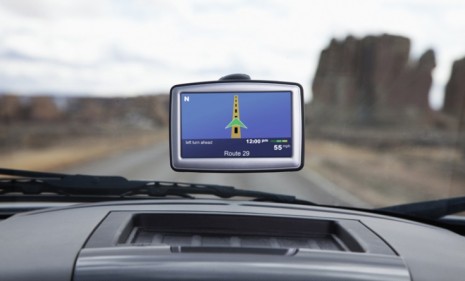The $30 GPS jammer that could paralyze U.S. cities
If cyber terrorists took down our GPS system they could cripple banks and crash airplanes. And there's a $30 box that could help them do it

A free daily email with the biggest news stories of the day – and the best features from TheWeek.com
You are now subscribed
Your newsletter sign-up was successful
Our society relies on the "invisible utility" known as GPS, says David Hambling at the New Scientist. Cell phones, ATMs, in-car navigation systems — they all rely on satellite signals. If they were suddenly jammed, chaos could ensue. But what would it take to jam GPS signals? Roughly $30. Here, an instant guide:
How exactly does GPS work?
A global positioning system (GPS) receiver gets signals from at least four orbiting satellites, allowing it to calculate its exact location. The dominant provider of satellite signals is the U.S. military, whose NavStar network has at least 24 satellites operating at any given time.
The Week
Escape your echo chamber. Get the facts behind the news, plus analysis from multiple perspectives.

Sign up for The Week's Free Newsletters
From our morning news briefing to a weekly Good News Newsletter, get the best of The Week delivered directly to your inbox.
From our morning news briefing to a weekly Good News Newsletter, get the best of The Week delivered directly to your inbox.
How easy is it to disrupt a GPS signal?
Very easy. GPS signals are extremely weak — after all, they're coming from around 12,000 miles away — so it doesn't take a lot of energy to disrupt them. David Last, a navigation consultant, managed to jam the network of a 500-ton ship using a homemade device. When he switched it on, the ship went "haywire," reports The New Scientist. Its navigation, radar, and communications systems all went down in a matter of minutes.
But that is just a ship. How could it disrupt a U.S. city?
A powerful enough jammer — or a number of strategically-placed smaller jammers — could disrupt GPS signals across an entire city. The threat is serious enough to have provoked a warning from NASA. A "multiple agency approach must be urgently developed and executed" to counteract the "alarming" rise in availability of GPS jammers, it warned in a paper last year. The threat to our national security could be "devastating."
A free daily email with the biggest news stories of the day – and the best features from TheWeek.com
How do these jammers work?
They broadcast a strong signal on the same frequency as the satellites, effectively drowning out the GPS signal. The simplest models plug into a cigarette lighter, and can prevent all GPS reception within a 10-mile radius. And some cost as little as $30 online.
So my Garmin would not work. Is that really a big deal?.
Actually, your in-car navigation system is one of the least critical networks that would be disrupted by a GPS jammer. Cell phone towers, power grids, and aircraft landing and traffic control systems could all be rendered useless by GPS jammers, as could bank machines and stock exchanges.
Has that kind of disruption happened yet?
Yes. A truck driver who used a small GPS jammer to avoid paying the New Jersey Turnpike toll inadvertently brought down Newark International Liberty Airport's GPS-based landing system once or twice a day for several months, simply by driving past it on his way to and from work. If it's that easy, says Emily Esfahani Smith at The Blaze, just "imagine a terrorist getting his hands on one of these."
Could a terrorist really use GPS jammers to disrupt a city?
Yes, says David Derbyshire at Britain's Daily Mail. A "single terrorist" armed with equipment costing less than $1,000 could "block the GPS signal over London and leave banks, emergency services, power plants and airports in chaos." Uh, hang on a second, says British cybersecurity expert Peter Sommer, as quoted in The Wall Street Journal. It would actually take unprecedented mastery of GPS technology to bring such "apocalyptic visions of a cyber-hell" to life. The idea that it would be easy for terrorists to cause "long-term, large scale disruption" is "entirely fanciful."
What do the experts want to do about it?
NASA wants the government to declare GPS "critical infrastructure," which would expand and strengthen defense of the satellite networks. It also advises building a back-up satellite system. Experts in Britain have advised banning the import and possession of GPS jamming devices, and using alternative technology, such as a low-frequency radio system, as a back-up to GPS.
Sources: NASA, New Scientist, Wall St. Journal, Daily Mail, The Blaze
-
 The 8 best TV shows of the 1960s
The 8 best TV shows of the 1960sThe standout shows of this decade take viewers from outer space to the Wild West
-
 Microdramas are booming
Microdramas are boomingUnder the radar Scroll to watch a whole movie
-
 The Olympic timekeepers keeping the Games on track
The Olympic timekeepers keeping the Games on trackUnder the Radar Swiss watchmaking giant Omega has been at the finish line of every Olympic Games for nearly 100 years